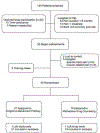An evaluation of the feasibility, acceptability, and preliminary efficacy of cognitive-behavioral therapy for opioid use disorder and chronic pain
- PMID: 30508769
- PMCID: PMC6312460
- DOI: 10.1016/j.drugalcdep.2018.10.015
An evaluation of the feasibility, acceptability, and preliminary efficacy of cognitive-behavioral therapy for opioid use disorder and chronic pain
Abstract
Aims: The primary study aim was to evaluate the feasibility and acceptability of cognitive-behavioral therapy (CBT) for opioid use disorder and chronic pain. The secondary aim was to examine its preliminary efficacy.
Methods: In a 12-week pilot randomized clinical trial, 40 methadone-maintained patients were assigned to receive weekly manualized CBT (n = 21) or Methadone Drug Counseling (MDC) to approximate usual drug counseling (n = 19).
Results: Twenty of 21 patients assigned to CBT and 18 of 19 assigned to MDC completed the pilot study. Mean (SD) sessions attended were 8.4 (2.9) for CBT (out of 12 possible) and 3.8 (1.1) for MDC (out of 4 possible); mean (SD) patient satisfaction ratings (scored on 1-7 Likert-type scales) were 6.6 (0.5) for CBT and 6.0 (0.4) for MDC (p < .001). The proportion of patients abstinent during the baseline and each successive 4-week interval was higher for patients assigned to CBT than for those assigned to MDC [Wald χ2 (1) = 5.47, p = .02]; time effects (p = .69) and interaction effects between treatment condition and time (p = .10) were not significant. Rates of clinically significant change from baseline to end of treatment on pain interference (42.9% vs. 42.1%, [χ2 (1, N = 40) = 0.002, p = 0.96]) did not differ significantly for patients assigned to CBT or MDC.
Conclusions: We found support for the feasibility, acceptability, and preliminary efficacy of cognitive-behavioral therapy relative to standard drug counseling in promoting abstinence from nonmedical opioid use among patients with opioid use disorder and chronic pain. Overall, patients exhibited improved pain outcomes, but these improvements did not differ significantly by treatment condition.
Keywords: Chronic pain; Clinical trial; Cognitive therapy; Counseling; Methadone; Opioid-related disorders; Treatment outcome.
Copyright © 2018 Elsevier B.V. All rights reserved.
Conflict of interest statement
Conflict of Interest
No conflict declared.
Figures
References
-
- Amato L, Minozzi S, Davoli M, Vecchi S, 2011. Psychosocial combined with agonist maintenance treatments versus agonist maintenance treatments alone for treatment of opioid dependence. Cochrane Database Syst. Rev CD004147. doi: 101002/14651858CD004147pub4. - PubMed
-
- American Psychiatric Association, 2000. Diagnostic and statistical manual of mental disorders American Psychiatric Association, Washington, DC.
-
- Arout CA, Edens E, Petrakis IL, Sofuoglu M, 2015. Targeting opioid-induced hyperalgesia in clinical treatment: Neurobiological considerations. CNS Drugs 29, 465–486. - PubMed
Publication types
MeSH terms
Substances
Grants and funding
LinkOut - more resources
Full Text Sources
Medical




